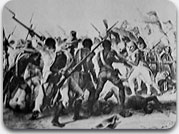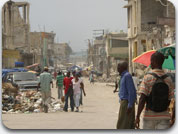

Haiti of the Past

Haiti of the Present

Haiti of the Future
Haiti In 1804, Haiti became the first free black republic to gain its independence through a violent defeat of Napoleon's great army. Since that time, the country has struggled to create a nation based on the ideals that it was founded on, and independent of foreign influence and interventions. For more than 200 years, the country has battled with ceaseless political upheavals, economic strifes, and social decay.
Haiti of the present remains challenged with lack of political leadership and vision, class divisions, social inequalities, and economic degradation. The Haiti earthquake of January 12, 2010, has caused great loss of lives, where more than 250,000 have perished, and widespread destruction of homes, buildings, and cultural assets. This natural disaster has set the country back even further from the already frail position it was in prior to the earthquake. Now is the time to rebuild. In light of this, Haiti has an incredible opportunity to become the country it was meant to become--a great nation of creative geniuses and proud people where all is free to pursue life, liberty, and happiness.
The Haiti of the Future can be very promising. However, Haiti needs visionary and capable leaders who can guide it through this massive challenge and once-in-a-lifetime opportunity. The country must work together with all its citizens, both inside and outside the country to achieve a better tomorrow. Is Haiti up to the challenge? Are the people up for it? Can they organize well enough to face it? Is the government capable of managing this challenge? Can it inspire the people to rally around a shared vision? And what is that vision?
The questions above offer a beginning to a dialogue that must take place before proceeding full-speed-ahead with reconstruction or rebuilding. The real and meaningful conversations regarding where Haiti is and where it is heading has not truly started.
Kylti would like to call on all Haitians to take action and join the effort to help Haiti find the right path to independence and achieve the freedom it fought for. In unity there is strength.












